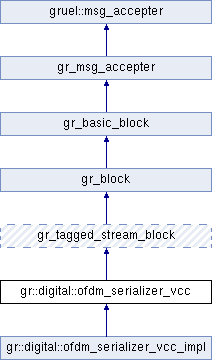gr::digital::ofdm_serializer_vcc Class Reference
Serializes complex modulations symbols from OFDM sub-carriersThis is the inverse block to the carrier_allocator_cvc. It outputs the complex data symbols as a tagged stream, discarding the pilot symbols. More...
#include <ofdm_serializer_vcc.h>

Public Types | |
| typedef boost::shared_ptr < ofdm_serializer_vcc > | sptr |
Static Public Member Functions | |
| static sptr | make (int fft_len, const std::vector< std::vector< int > > &occupied_carriers, const std::string &len_tag_key="frame_len", const std::string &packet_len_tag_key="", int symbols_skipped=0, const std::string &carr_offset_key="", bool input_is_shifted=true) |
| static sptr | make (const digital_ofdm_carrier_allocator_cvc_sptr &allocator, const std::string &packet_len_tag_key="", int symbols_skipped=0, const std::string &carr_offset_key="", bool input_is_shifted=true) |
Detailed Description
Serializes complex modulations symbols from OFDM sub-carriers
This is the inverse block to the carrier_allocator_cvc. It outputs the complex data symbols as a tagged stream, discarding the pilot symbols.
If given, two different tags are parsed: The first key (len_tag_key) specifies the number of OFDM symbols in the frame at the input. The second key (packet_len_tag_key) specifies the number of complex symbols that are coded into this frame. If given, this second key is then used at the output, otherwise, len_tag_key is used. If both are given, the packet length specifies the maximum number of output items, and the frame length specifies the exact number of consumed input items.
It is possible to correct a carrier offset in this function by passing another tag with said offset.
Input: Complex vectors of length fft_len Output: Complex scalars, in the same order as specified in occupied_carriers.
Member Typedef Documentation
Member Function Documentation
| static sptr gr::digital::ofdm_serializer_vcc::make | ( | int | fft_len, |
| const std::vector< std::vector< int > > & | occupied_carriers, | ||
| const std::string & | len_tag_key = "frame_len", |
||
| const std::string & | packet_len_tag_key = "", |
||
| int | symbols_skipped = 0, |
||
| const std::string & | carr_offset_key = "", |
||
| bool | input_is_shifted = true |
||
| ) | [static] |
- Parameters:
-
fft_len FFT length occupied_carriers See ofdm_carrier_allocator_cvc. len_tag_key The key of the tag identifying the length of the input frame in OFDM symbols. packet_len_tag_key The key of the tag identifying the number of complex symbols in this packet. symbols_skipped If the first symbol is not allocated as in occupied_carriers[0], set thiscarr_offset_key When this block should correct a carrier offset, specify the tag key of the offset here (not necessary if following an ofdm_frame_equalizer_vcvc) input_is_shifted If the input has the DC carrier on index 0 (i.e. it is not FFT shifted), set this to false
| static sptr gr::digital::ofdm_serializer_vcc::make | ( | const digital_ofdm_carrier_allocator_cvc_sptr & | allocator, |
| const std::string & | packet_len_tag_key = "", |
||
| int | symbols_skipped = 0, |
||
| const std::string & | carr_offset_key = "", |
||
| bool | input_is_shifted = true |
||
| ) | [static] |
- Parameters:
-
allocator The carrier allocator block of which this shall be the inverse packet_len_tag_key The key of the tag identifying the number of complex symbols in this packet. symbols_skipped If the first symbol is not allocated as in occupied_carriers[0], set thiscarr_offset_key When this block should correct a carrier offset, specify the tag key of the offset here (not necessary if following an ofdm_frame_equalizer_vcvc) input_is_shifted If the input has the DC carrier on index 0 (i.e. it is not FFT shifted), set this to false
The documentation for this class was generated from the following file:
